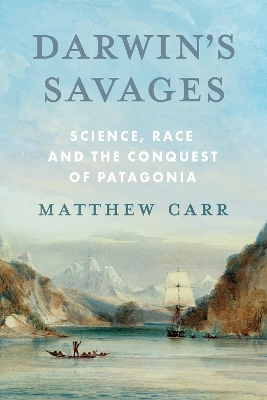
Darwin’s Savages
Science, Race and the Conquest of Patagonia
Seiten
2025
C Hurst & Co Publishers Ltd (Verlag)
978-1-80526-283-1 (ISBN)
C Hurst & Co Publishers Ltd (Verlag)
978-1-80526-283-1 (ISBN)
- Noch nicht erschienen (ca. Mai 2025)
- Versandkostenfrei innerhalb Deutschlands
- Auch auf Rechnung
- Verfügbarkeit in der Filiale vor Ort prüfen
- Artikel merken
An unsettling journey through the calamitous consequences of settler colonialism in Patagonia--and the story of the world-renowned scientist who witnessed it.
In December 1832, Charles Darwin sailed into Tierra del Fuego, down at the tip of South America, and encountered 'Indians' for the first time. 'I would not have believed how entire the difference between savage and civilised man is,' he wrote. 'It is greater than between a wild and [a] domesticated animal.' But he was shocked by the 'war of extermination' he witnessed in northern Patagonia, waged by the colonising army of Buenos Aires.
Darwin's Savages explores how these experiences influenced Darwin's writings, as well as the justifications for racial 'exterminations' that others drew from his work. In a sweeping account of soldiers, missionaries, anthropologists and skullcollecting scientists, Matthew Carr traces the connections between colonial expansionism and scientific racism, and the tragic 'extinction' of indigenous peoples in one of the most remote places on Earth.
Combining travelogue, history and essay, this is a compelling journey through Patagonia past and present, from indigenous graveyards and military memorials to archaeological sites and natural history museums. Amid global battles for historical memory, culture wars over race and empire, and ongoing struggles for indigenous rights, Carr chronicles the conquest of Argentina's First Peoples--and the ideas that made it possible.
In December 1832, Charles Darwin sailed into Tierra del Fuego, down at the tip of South America, and encountered 'Indians' for the first time. 'I would not have believed how entire the difference between savage and civilised man is,' he wrote. 'It is greater than between a wild and [a] domesticated animal.' But he was shocked by the 'war of extermination' he witnessed in northern Patagonia, waged by the colonising army of Buenos Aires.
Darwin's Savages explores how these experiences influenced Darwin's writings, as well as the justifications for racial 'exterminations' that others drew from his work. In a sweeping account of soldiers, missionaries, anthropologists and skullcollecting scientists, Matthew Carr traces the connections between colonial expansionism and scientific racism, and the tragic 'extinction' of indigenous peoples in one of the most remote places on Earth.
Combining travelogue, history and essay, this is a compelling journey through Patagonia past and present, from indigenous graveyards and military memorials to archaeological sites and natural history museums. Amid global battles for historical memory, culture wars over race and empire, and ongoing struggles for indigenous rights, Carr chronicles the conquest of Argentina's First Peoples--and the ideas that made it possible.
Matthew Carr is the author of non-fiction books including Blood and Faith; Fortress Europe; and Savage Frontier (all published by Hurst), as well as two novels, The Devils of Cardona and Black Sun Rising. He has written for The New York Times, The Guardian and others. He lives in Sheffield.
| Erscheint lt. Verlag | 29.5.2025 |
|---|---|
| Zusatzinfo | 12 Illustrations, black and white |
| Verlagsort | London |
| Sprache | englisch |
| Maße | 156 x 234 mm |
| Themenwelt | Geisteswissenschaften ► Geschichte ► Allgemeine Geschichte |
| Geschichte ► Teilgebiete der Geschichte ► Wirtschaftsgeschichte | |
| Sozialwissenschaften ► Ethnologie | |
| Sozialwissenschaften ► Soziologie | |
| ISBN-10 | 1-80526-283-1 / 1805262831 |
| ISBN-13 | 978-1-80526-283-1 / 9781805262831 |
| Zustand | Neuware |
| Haben Sie eine Frage zum Produkt? |
Mehr entdecken
aus dem Bereich
aus dem Bereich


